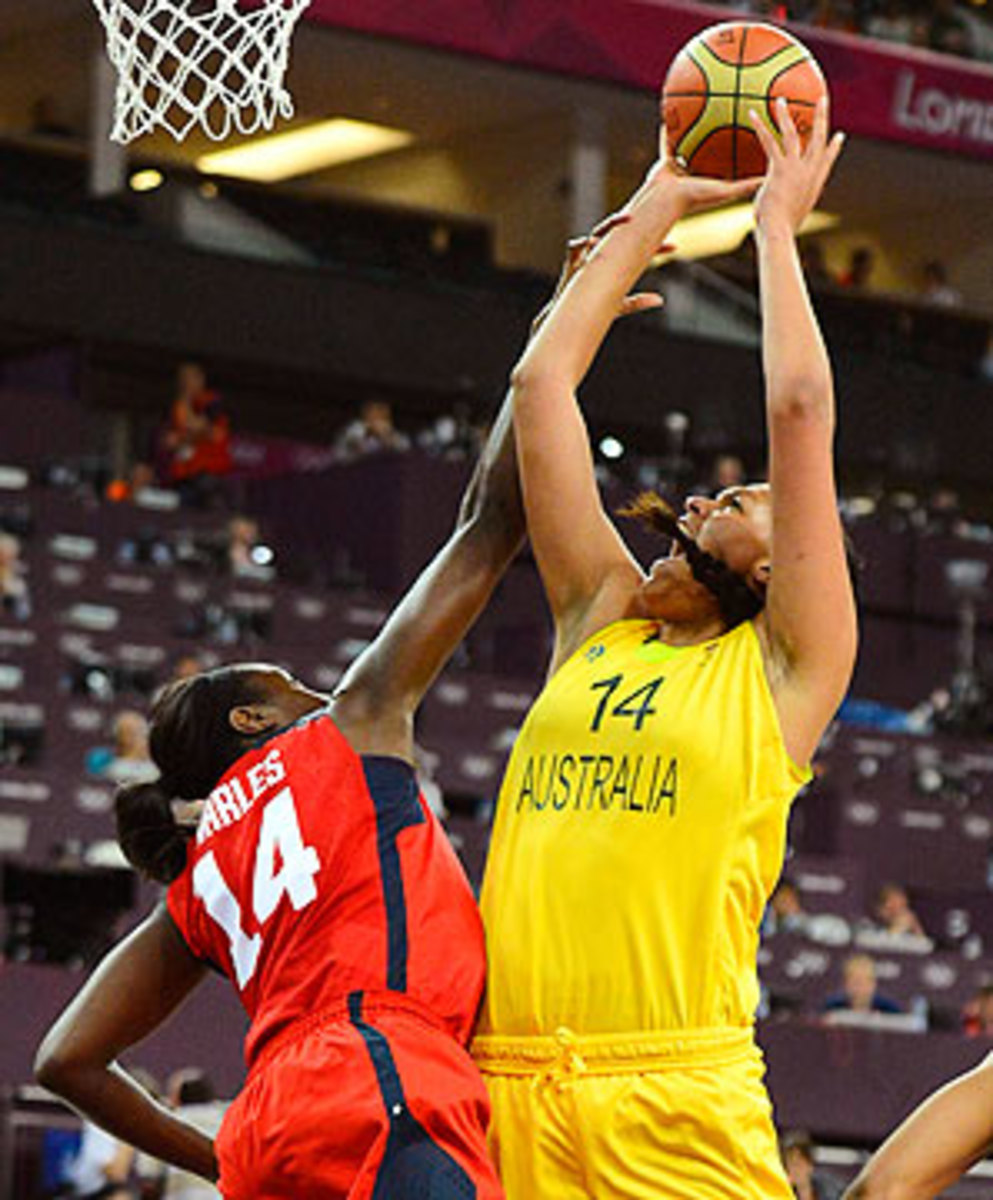
U.S. shows depth in second half as they hand Australia crushing loss
"Everybody thinks we steam roll, but go look at previous Olympic box scores, that's not always the case," she said.
It certainly wasn't the case in the first half of the first women's semifinal at London's North Greenwich Arena Thursday night. After a pool play loss to France had forced them to face the U.S. a round earlier than their accustomed gold medal game slot (the U.S. has beat Australia in the gold medal game the last three Olympics), the Australians had come out inspired.
As a team they shot 61% for the half, and 6'8" center Elizabeth Cambage, a 20-year-old who had already made a name for herself by dunking in an Olympic game (against Russia on August 3), a likely first for a female, had had her way inside the key against the Americans by sealing off frontline defenders deep in the paint and scoring at will. When the horn sounded at the half, Cambage had 19 points on 67% shooting.
But the Aussies were up just 47-43.
"We took what I think you could probably call Australia's best shot, (and) we were only down four," says Bird. "We took that as a positive. Obviously we weren't happy. But we weren't concerned; nobody had their head hanging low or anything like that. We knew these games would be like this."
How easy it is to expect constant dominance from this group. The Americans had decisively beaten every one of their previous Olympic opponents, using exhausting defense and matchless depth to rack up six straight victories by nearly 38 points a game. Their superiority was historic, too: their 91-48 win over Canada on August 7 was their 39th straight Olympic victory, dating back to the bronze-medal game in Barcelona in 1992. In London, no team had given them much of a challenge before Australia.
"We've played a lot of basketball in the last month and I don't think anyone's played better against us than Australia in that first half," said U.S. coach Geno Auriemma. "It's incredible what they did to us. I'm impressed with the way we came back."
Of course the U.S. came back. It always does, on those rare occasions when it needs to. The Americans never panic, right?
"This being my first go-around, I was a little... you know," admitted U.S. starting center Tina Charles, not daring to even speak the word. But whatever concern she had about the US losing a shot at winning its fifth straight gold medal she funneled into resolve to follow her teammates' and coaches' orders and stop Cambage. In the second half, said Charles, "I took it personal."
So Charles did her best to hold Cambage at the free throw line and knock away balls she unwisely held behind her head. To help the defensive cause, U.S. coach Geno Auriemma switched to a two-three zone in the third quarter. "I think that shook us up a bit," said Cambage, who had zero points in the second half.
The U.S. offense settled in, too. Co-captain Diana Taurasi opened up the second half with a three-point shot, cutting Australia's lead to one before half a minute of the third quarter had ticked away. A few moments later she hit another to give the U.S. a three-point lead.
When Taurasi went to the bench with her fourth foul with 3:12 to go in the third quarter, reserve guard Lindsay Whalen hit three straight baskets to spark a 10-3 run to end the third quarter. In the fourth quarter the U.S. took advantage of the Aussies' fatigue to outscore them 21-14. For the game, Charles and Taurasi each had 14 points while all but two U.S. players scored at least four.
It was an agonizing defeat for Australia, which has never beaten the U.S. in Olympic or world championship competition, let alone won an Olympic gold medal. The Opals had been so intent on winning gold after three straight Olympic silver medals that almost all the national team players who play in the WNBA, including Cambage and four-time Olympian Lauren Jackson, had skipped the first half of the WNBA season to stay Down Under and cohere with their fellow Opals. (The one who didn't, Indiana Fever guard Erin Phillips, was cut from the team.)
After yet another crushing loss to the Americans, Jackson, who had 14 points and 17 rebounds, pondered a career without an Olympic gold. "I'm pretty numb at the moment," said the 31-year-old three-time WNBA MVP. "I think we played well. Sometimes in the past [against the U.S.] I think we gave up, but we did our best today. They were better. This time we can walk away with our heads held high."
Asked if she might try again, in 2016, Jackson wouldn't commit. "Look, I'm getting old," she said. "I don't know what I'm going to be doing in four years. We've got one more game left [the bronze medal game, against Russia] and we need to focus on that."
And the U.S. needs to focus on France, the winner of the second semifinal Thursday. "France in their group was just spectacular," said Auriemma. "Their point guard [Celine Dumerc] has had a tournament for the ages. They're big, they're experienced, and they've been together a long time. They've got great guard play and they have credible size."
In other words, the French could pose a significant hurdle to the Americans' fifth straight gold medal. But now this U.S. group knows it can face a challenge and survive.




